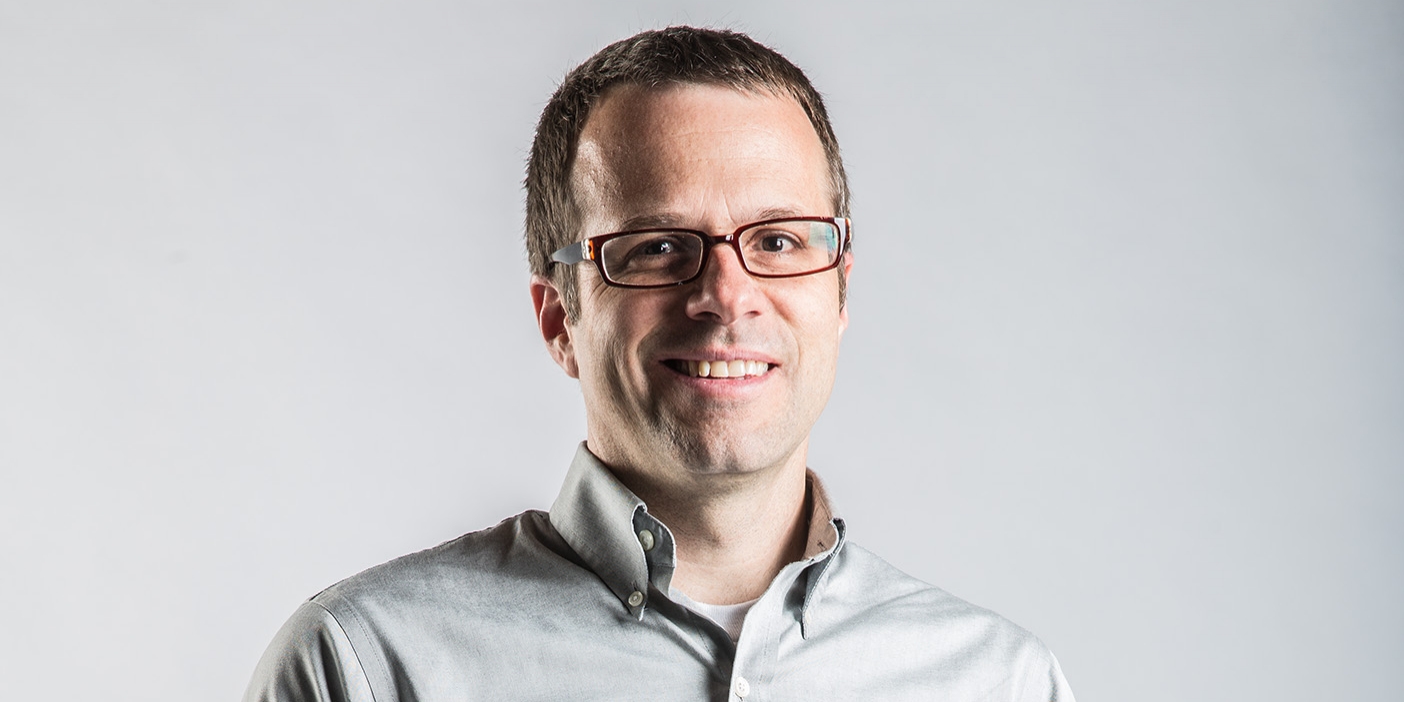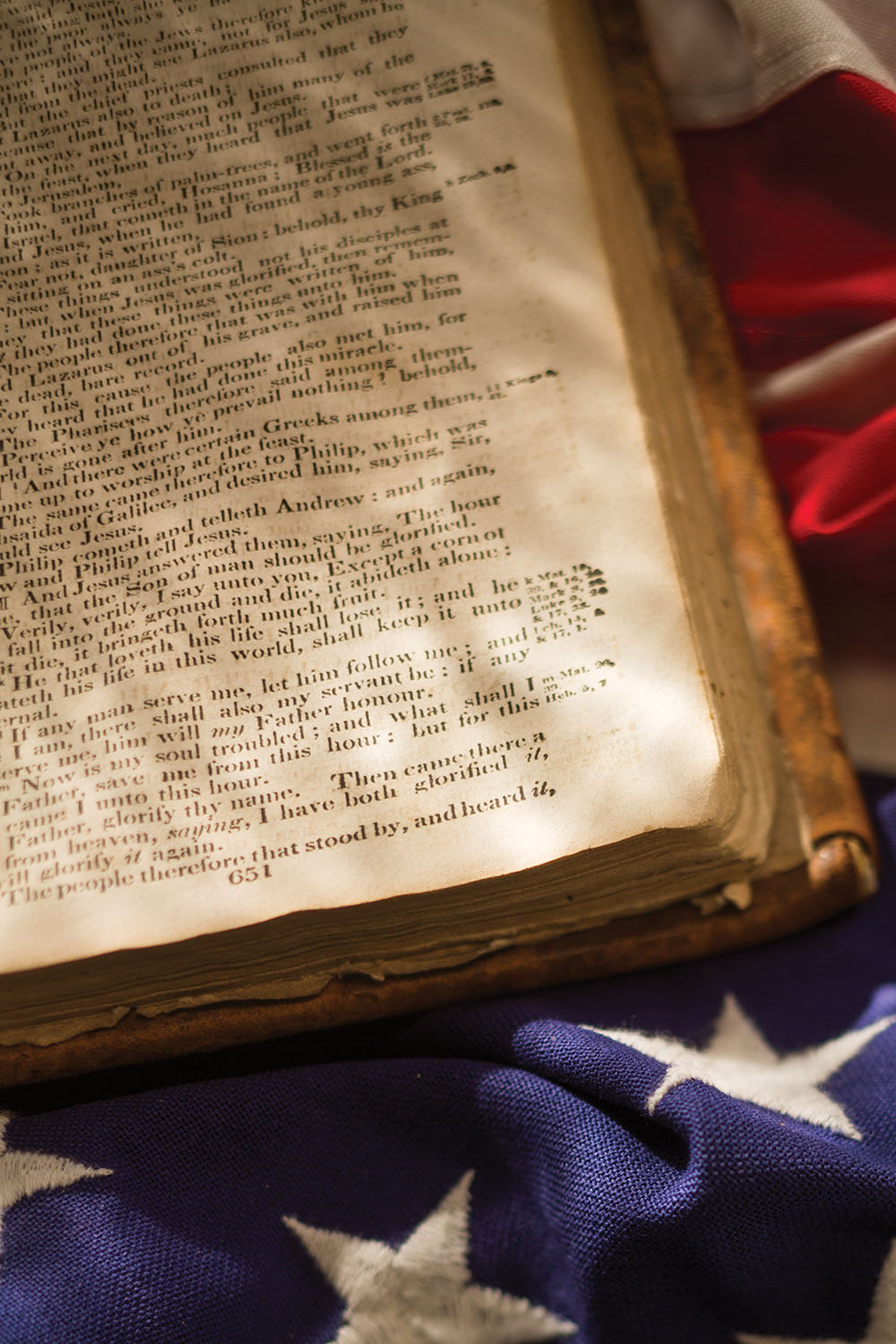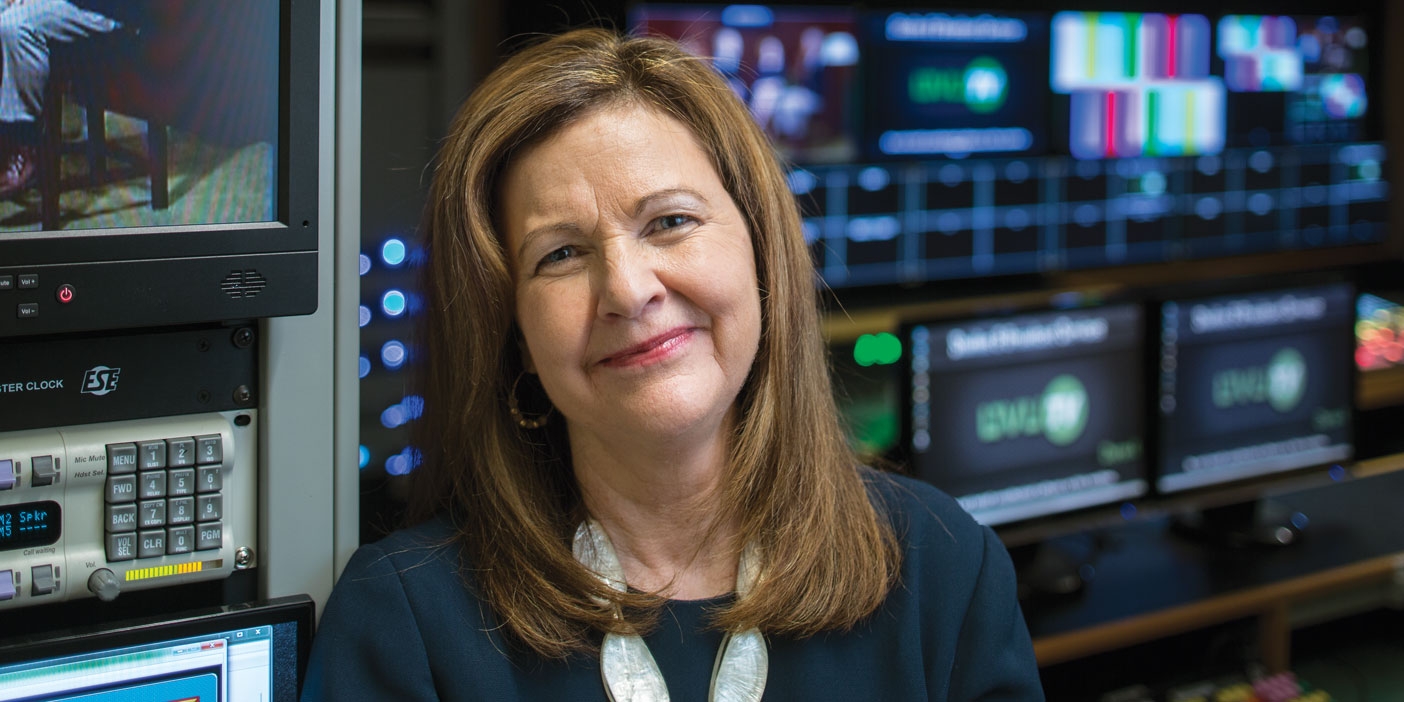Ending the Uncivil War
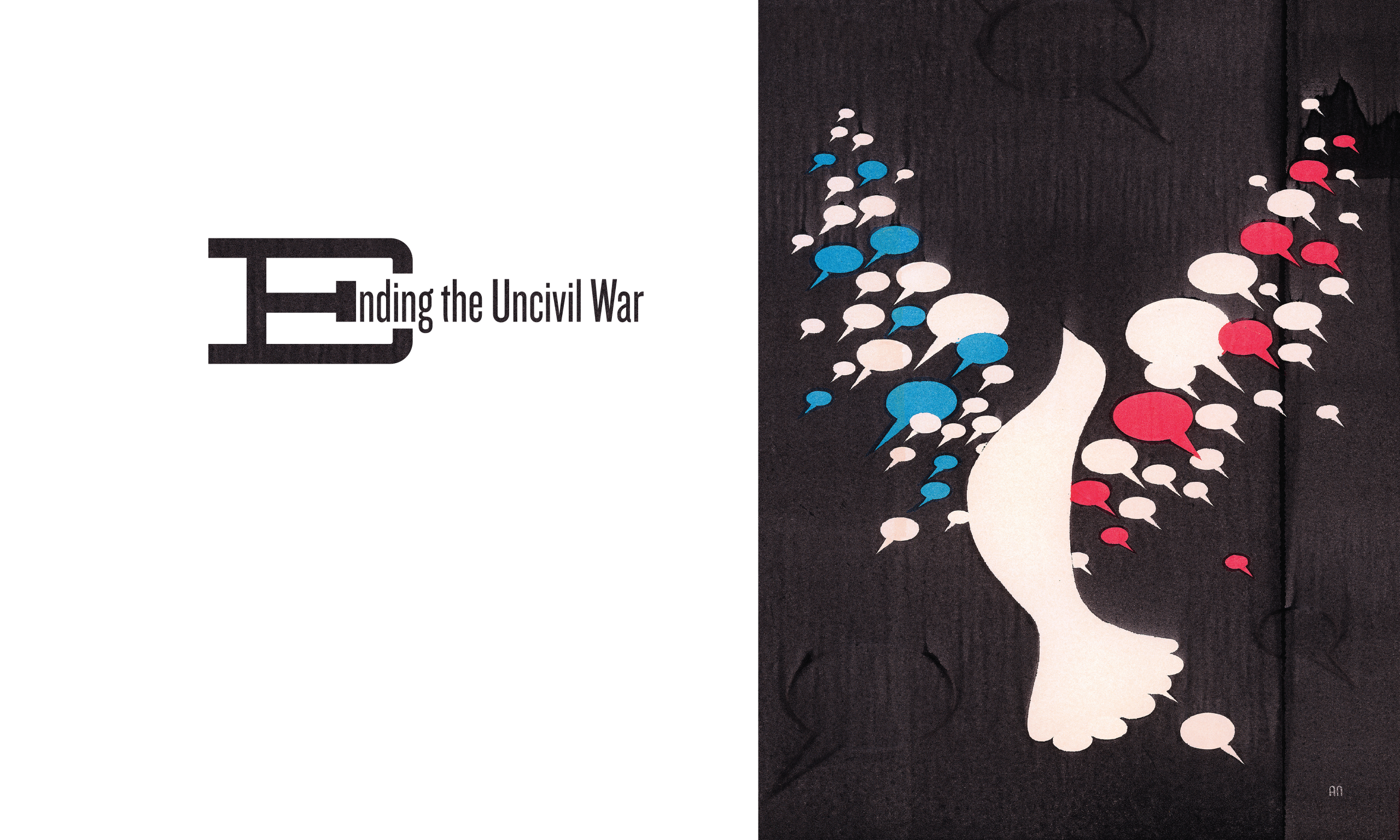
Ending the Uncivil War
By Multiple Writers and Thomas B. Griffith (BA ’78) in the Fall 2012 Issue
Illustrations by Alex Nabaum
The Founders of the United States set out “to form a more perfect Union”—to establish conditions likely to lead to safe, civil, harmonious society. Ironically, from that founding to today, American unity has been established and maintained largely through the intense competition of diverse ideas—the cacophonous, fractious, partisan wrangling that shapes and eventually results in public policy. Freedom of speech guarantees that political progress will rarely be tidy, quick, or quiet. And that’s just what the Founders intended.
But in a year leading up to a presidential election—a year characterized by angry, discordant, even hostile voices filling airwaves, town halls, and message boards—many have worried about collateral damage to the public square. Has the healthy debate at the heart of America eroded in recent decades to mere bickering and intolerance? Can a society so marked by distrust and division realize the productive, unifying goals of democracy?
In recent events at BYU, prominent voices have called for an end to hostilities. While debate must continue, these speakers believe it can happen with more respect, inclusiveness, civility, and goodwill. In the following adaptations of campus addresses, four visitors argue for a renewal of the public square, where all can be part of a political debate that is at once impassioned and respectful.
Campaigning for Civility
By Mark Demoss
We are in the middle of an intense political season in this country, and I’ve been privileged to be an advisor to a presidential campaign—something I’ve done voluntarily in both this cycle and the last one. As an evangelical Christian, I was well aware of doctrinal differences between The Church of Jesus Christ of Latter-day Saints and my faith. But once I decided to help on Mitt Romney’s campaign, I began to see an all-too-ugly side of a theological divide. Sadly, far too much of the ugliness—though certainly not all of it—came from within my own camp.
This treatment of Mormons by many who claim to be followers of Christ, along with the sometimes violent treatment from those who oppose your church for your strong defense of traditional marriage, prompted me, as an evangelical Christian, to try to inspire a national dialogue about civility.
Also, though I disagreed with then Senator Obama on many things, I found myself, even as a political conservative, being troubled by the way many people were treating him—ways I also didn’t think were Christlike.
So I decided to launch a civility project. I bought the appropriate domain addresses and began to develop a plan and a website. I wrote a simple three-point pledge, which I thought anyone in this country could agree to, regardless of political or religious affiliation. It read as follows:
1. I will be civil in my public discourse and behavior.
2. I will be respectful of others, whether or not I agree with them.
3. I will stand against incivility where and when I see it.
As I prepared to launch this project following the contentious 2008 election, I decided I needed a liberal counterpart. I didn’t want this effort to look like a conservative was lecturing the left on incivility, especially since there was so much incivility within my own ranks. So I reached out to a most unlikely partner.
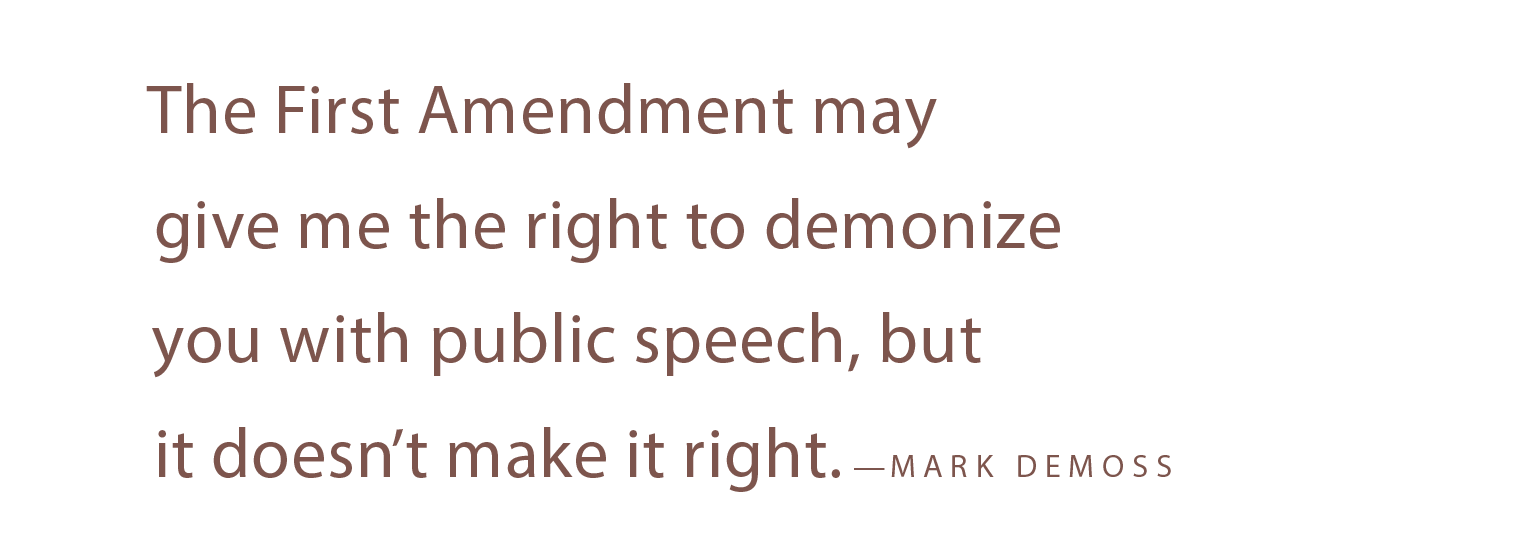
Lanny Davis was the White House counsel at the end of President Clinton’s second term. He is a self-described liberal and a democratic power broker. Lanny is also Jewish. I didn’t know Lanny at this point, but I had written him a letter some six months earlier. As an avid supporter of Hillary Clinton’s presidential campaign, Lanny was on television quite a bit during the primary season. Whenever I saw him on TV, I found myself saying, “Now there’s a liberal I really like.”
You see, Lanny was always respectful of his adversaries. He didn’t interrupt or raise his voice. He didn’t attack on a personal level or on motive—only on policy. So as Hillary Clinton was ending her campaign, I sat down and wrote a letter to Lanny at his law firm in Washington, D.C. It began this way: “Dear Lanny, I am an evangelical and a conservative Republican who has spent the past year trying to get Mitt Romney elected president, and I suspect that, politically, you and I may have nothing in common.”
I went on to commend him for his civility in the public square and to encourage him after a hard-fought campaign. We had no further contact for six months, until I sent him an e-mail late one night reminding him of my letter and telling him I was starting a civility project.
“Could I come to D.C. and get your thoughts on it?” I asked.
At 4:36 the next morning I received an e-mail I will never forget. “Mark, I’d be honored to meet you,” it said. “Your letter sits in a frame on a bookshelf in my office. Call my assistant and set it up.”
When I went to see Lanny the next month, he was on a call in his office but motioned for me to come in. While he finished his call I surveyed his walls, covered with framed notes and photos of Lanny with members of Congress, a secretary of state, and several presidents, including one of him and his 10-year-old son with President Bush on Air Force One. And there, displayed on his bookshelf, was my letter.
Lanny hung up the phone, pointed to the bookshelf, and said, “That’s the nicest letter I’ve ever received.”
Lanny Davis and I were, by any assessment, a political odd couple. But, thanks to a simple letter with a civil and respectful tone, we became fast friends. He offered his full help, and on the eve of the inauguration of Barack Obama, we launched the Civility Project with an op-ed we wrote together for the Washington Times.
For two years we promoted civility through our website and through national media and various speaking opportunities—opportunities that took me to places like the National Press Club in Washington, a synagogue in Houston, and the West Wing of the White House.
In the summer of 2010, anticipating an ugly midterm election cycle, we sent a letter to every member of Congress and every sitting governor asking them to sign this simple pledge. Six months later, just three—three out of 585—had done so: Senator Joseph Lieberman and Representatives Frank Wolf and Sue Myrick.
I dissolved the project a year ago, after concluding I wasn’t able to devote the time and attention it deserved. Days later, Arizona Congresswoman Gabrielle Giffords was shot at a political event, and the national debate about civility erupted once again.
Most people viewed this civility project in a political context, but, as a follower of Christ, I had another motive. The Apostle Paul writes in the book of Philippians, “But in lowliness of mind let each esteem others better than himself” (New King James Version [NKJV], Philip. 2:3).
The First Amendment may give me the right to demonize you with public speech, but it doesn’t make it right.
Paul then challenges the Colossians to “let your speech always be with grace, seasoned with salt, that you may know how you ought to answer each one” (NKJV, Col. 4:6). And his final charge in his first letter to the Corinthians is crystal clear: “Let all that you do be done with love” (NKJV, 1 Cor. 16:14).
Addressing a general conference, Elder Quentin L. Cook correctly pointed out:
There are some who feel that venting their personal anger or deeply held opinions is more important than conducting themselves as Jesus Christ lived and taught. . . . How we disagree is a real measure of who we are and whether we truly follow the Savior. It is appropriate to disagree, but it is not appropriate to be disagreeable. . . . If we show love and respect even in adverse circumstances, we become more like Christ. [“We Follow Jesus Christ,” Ensign, May 2010, pp. 84–85]
I will not attempt to speak for your church, but I will speak for and to mine: It is never an option to claim Jesus Christ as Savior and behave in an uncivil manner with anyone, under any circumstance. Never.
I pray I will be known for speech seasoned with grace, for regarding others as more important than myself, and for doing everything with love. In these days of political divisiveness, I urge all of us to defer to what Abraham Lincoln described in his first inaugural address as “the better angels of our nature.”
This article is adapted from a forum address by Mark DeMoss, founder of the public relations agency The DeMoss Group, on Jan. 24, 2012. The full text is available at speeches.byu.edu.
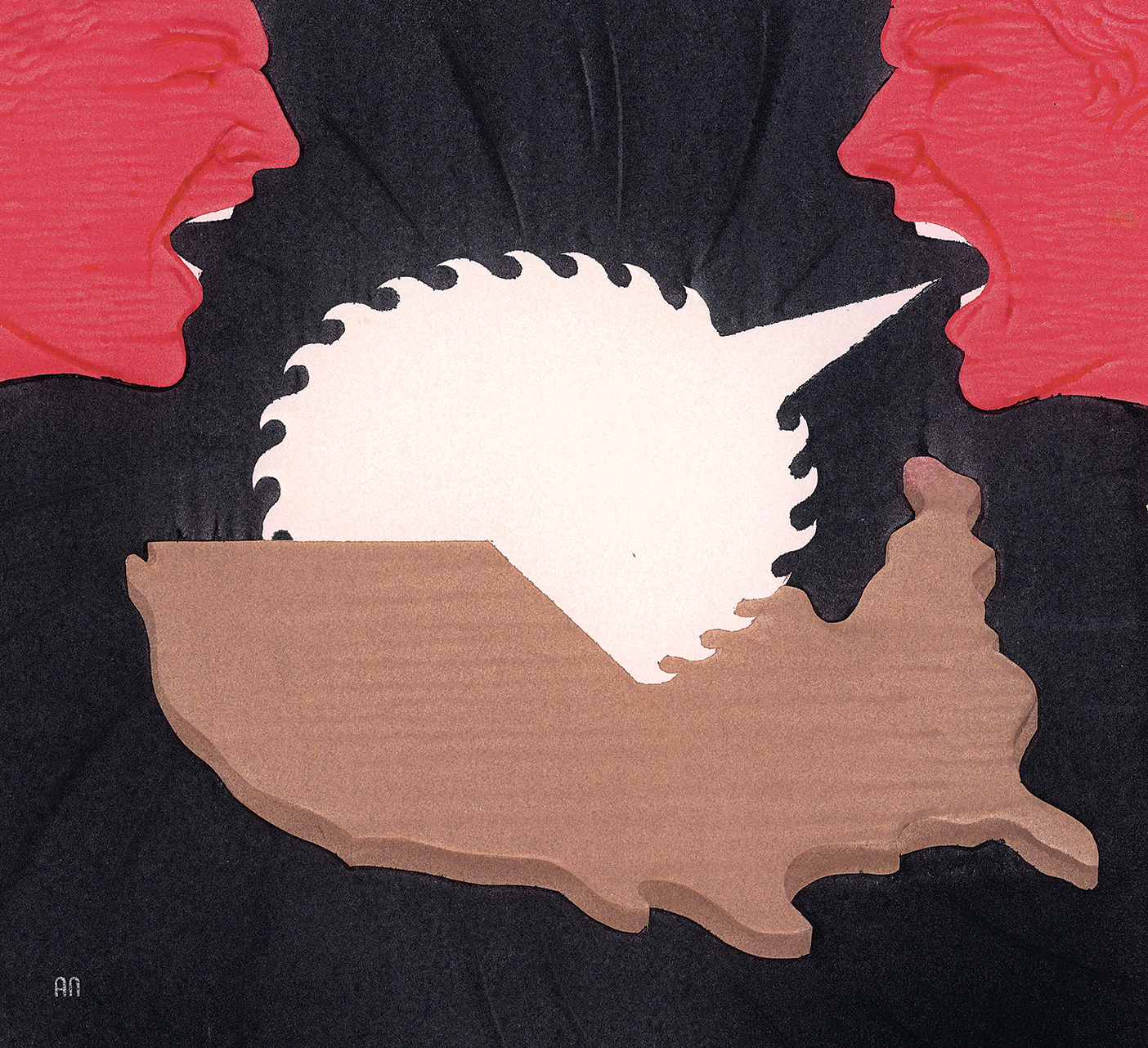
The Case for Partisanship
By Karen Weggeland Hale (BA ’80)
Several years ago in a New York City restaurant, my husband and I visited with our friends Elder and Sister Walker, a Latter-day Saint missionary couple. We had come to New York to visit our daughter, but we were glad for a chance to meet up with the Walkers and discuss, not Church growth, but rather partisanship and politics.
Sister Olene Smith Walker (BS ’53) had served in the Utah State House, then as Utah’s lieutenant governor, and later became the first woman to serve as Utah’s executive-in-chief. I greatly respect her work, and when I served as a state senator, I especially enjoyed the occasions when Governor Walker would come to the senate floor during informal moments, sit with a few of us, and chat about different bills she supported or opposed.
Olene and I had actually been opponents in 2000 as lieutenant governor nominees on the ballot. I was the Democratic candidate. She was the Republican—and victorious—candidate.
After Olene left office as governor in 2005 and moved to St. George, Utah, the Church News ran a feature on the former governor, highlighting her new focus as a ward Primary president. Olene and her husband, Myron, went on to serve as public affairs missionaries in New York City with an emphasis on making friends and building bridges with ambassadors to the United Nations.
Catching up with Olene and Myron in the Big Apple, it was clear that Olene was focused on her present work while remaining committed to lifelong involvement in politics and the notion that finding common ground with others is the best way to solve problems.
Over the last several years we have seen resistance to this notion and a rise in extreme partisanship contribute to a decline not only in our public discourse, but also in our ability to create good public policy and move our country forward.
For many public servants, partisanship seems to have taken precedence over the motives that drew them to political involvement in the first place—to promote the public, or common, good and to improve the lives of Americans.
Looking at the controversial, adversarial nature of politics today, we might ask, who in the world would want to get involved? The partisanship, the bickering, the ridicule, and the name-calling are all legitimate reasons to think twice about jumping into the political arena. These unsavory by-products also dim our hopes of making a positive difference in our government, communities, and society.
More than 14 years ago, on his way out of office after serving nearly 25 years in the U.S. Senate, John Glenn noted in an interview with Time magazine that there was greater partisanship in Washington than there had ever been. He added,
I worry about the future when we have so many young people who feel apathetic and critical and cynical about anything having to do with politics. They don’t want to touch it. And yet, politics is literally the personnel system for democracy. We’ve got the finest democracy in the world, but it’s also one of the most complicated. Not everyone needs to run for public office, but every time someone drops out of the system it means they in effect give their franchise to somebody else. . . .
If you say politics is so dirty you don’t want anything to do with it, what you’re really saying is that you don’t want to get dirty from democracy.
President Barack Obama, in an address to University of Michigan graduates in 2010, said
Politics has never been for the thin-skinned or the faint-of-heart, and if you enter the arena, you should expect to get roughed up. Moreover, democracy in a nation of more than 300 million people is inherently difficult. It’s always been noisy and messy, contentious, complicated. We’ve been fighting about the proper size and role of government since the day the Framers gathered in Philadelphia. We’ve battled over the meaning of individual freedom and equality since the Bill of Rights was drafted. As our economy has shifted emphasis from agriculture to industry to information to technology, we have argued and struggled at each and every juncture over the best way to ensure that all of our citizens have a shot at opportunity. . . .
. . . What is amazing is that despite all the conflict, despite all its flaws and its frustrations, our experiment in democracy has worked better than any form of government on Earth.
So I ask, in terms of making a difference in government and society, do the pros of political involvement outweigh the cons?
I believe the answer is yes.
And to fully engage in politics in a democracy that functions on a two-party system, you may need to affiliate with a specific party.
It is unlikely that any one party will encompass and represent all of your beliefs. You will need to select the party with which you most identify. For me that is the Democratic Party; for Olene Walker, that is the Republican Party. We are still friends.
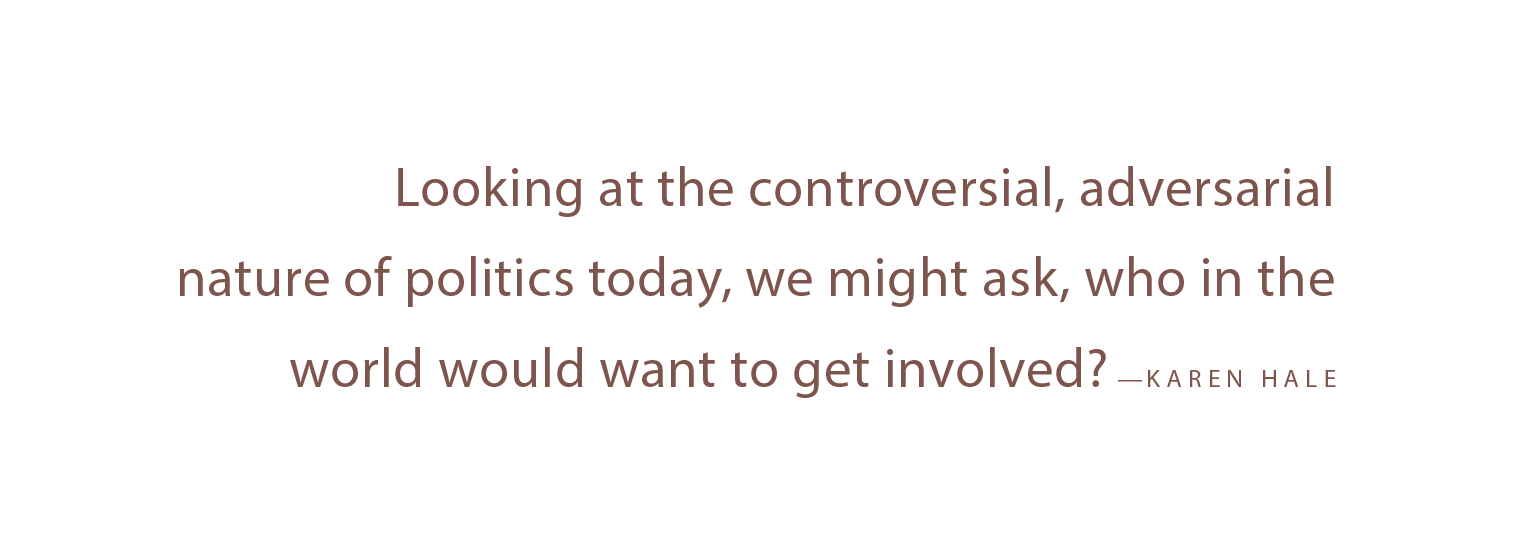
As Church members, we sometimes get caught up in society’s tendency to demonize not only a particular political party but also those who belong to it. Some come to equate alignment with one party to alignment with gospel principles without recognizing there are good Democrats, good Republicans, and good Libertarians who are also good disciples of Christ.
In a 1998 Salt Lake Tribune interview, Elder Marlin K. Jensen noted that “principles compatible with the gospel may be found in the platforms of all major political parties.”
I believe that partisanship—in the sense that we claim a political party and work within the structure of a largely partisan system to participate in the process of government and engage in robust, civil dialogue—is compatible with the gospel of Jesus Christ.
However, partisanship—in the sense that we demean, belittle, and separate ourselves from those who hold differing political views and that we place party success ahead of the common good—is not compatible with the gospel of Jesus Christ.
For the personnel system of democracy to succeed, we must find ways to actively and effectively engage in the political process. We need to find ways to debate issues, tackle challenges, and find solutions together. As we run for office, sit on boards or commissions or volunteer on campaigns, we can employ politics as a constructive means to address the challenges we face in our country.
Can we engage in politics without becoming negatively partisan? Yes. Politics is not a bad thing. Partisanship need not be a bad thing. Remember, politics is the personnel system of the democracy that we love. Is getting involved in politics worth occasional discomfort? Yes. Our democracy is worth it. Can we improve the quality of our political dialogue? Yes. We can practice being more civil.
Becoming more civil may require that, from time to time, we change the radio station or television channel, broaden our daily news diet, and listen to people who may disagree with our points of view. As we work to understand other perspectives, we may just get a taste of where the other side is coming from and occasionally find common ground upon which to build.
After serving as U.S. senate majority leader and then as Ronald Reagan’s White House chief of staff, Howard Baker stated in an address to the U.S. Senate, “I continue in my long-held faith that politics is an honorable profession. I continue to believe that only through the political process can we deal effectively with the full range of the demands and dissents of the American people.”
He added, “The founders didn’t require a nation of supermen to make this government and this country work, but only honorable men and women laboring honestly and diligently and creatively in their public and private capacities.”
Karen Hale is a former Utah state senator and vice chair of the Utah Democratic Party. This article is adapted from remarks she gave at a BYU panel discussion on partisanship on Jan. 24, 2012.
Religious Democracy
By Senator Joseph I. Lieberman
My Jewish faith is central to my life, including my career in politics. My faith has provided me with a foundation, an order, and a purpose and has so much to do with the way I navigate through each day, both personally and professionally, in ways both large and small.
I observe the Sabbath, or Shabbat, as it is called in Hebrew. This means that, from sunset on Friday until sunset on Saturday, I turn off my Blackberry; I do not drive or ride in a car; if there is a vote in the Senate, I will walk there from my home a few miles away. I believe the Sabbath is a gift from God that “keeps” and nurtures those of us who observe it. That has certainly been true for me.
In the current presidential campaign, discussions and debates about the relationship between politics and religion have played a prominent role. These are questions that are very old—going all the way back to the Founders of our country, who wrote the Declaration of Independence and later the Constitution.
The vision of our Founders is relevant because it reminds us that, from the beginning, America has been a nation that has been defined not by our borders, but by our values. One of those founding values was a belief in a higher power—a belief in God. The United States was formed, as the Declaration of Independence says, to secure the people’s “inalienable rights” of “life, liberty, and the pursuit of happiness” that were endowed by our Creator. In that way, the United States of America was and is a faith-based initiative.
Our Founders were overwhelmingly men of the same Christian faith, yet the founding documents they bequeathed us guarantee religious freedom, including the right of every American to hold elective office regardless of his or her religion. Article VI of our great Constitution explicitly bans religious tests for elective officials, and the First Amendment prohibits the establishment of an official religion, ensuring for every American the right to worship—or not to worship—as he or she so chooses. The full promise of this founding vision, I believe, is one of freedom of religion, not freedom from religion.
From 1776 to today, America has been a uniquely religious country. Alexis de Tocqueville, the famous French student of 19th-century America, noted that there is no country in which religion “retains greater influence over the souls of men than in America” and added that “there can be no greater proof of its utility and its conformity to human nature than that its influence is powerfully felt over the most enlightened and free nation on earth.” This observation is still true today: more than 90 percent of Americans say they believe in God, and the majority of Americans regularly attend a house of worship.
Tocqueville recognized that, though characterized by different and diverse belief systems, Americans are united by universal values. Indeed, religious freedom in America has given birth to a set of shared religious values that constitute what Abraham Lincoln called America’s “political religion” and Walt Whitman praised as “a sublime and serious Religious Democracy.”
This combination of religion and democracy has been a force for good in American history. Some of the great movements of conscience in America emerged from the convictions of religious people and used the language and liturgy of faith to build support. It was this spirit that animated the abolitionist movement in the mid-19th century and the suffragist activists of the 20th century. And it was this spirit that I was personally privileged to witness when I was in college at Yale in the early 1960s.
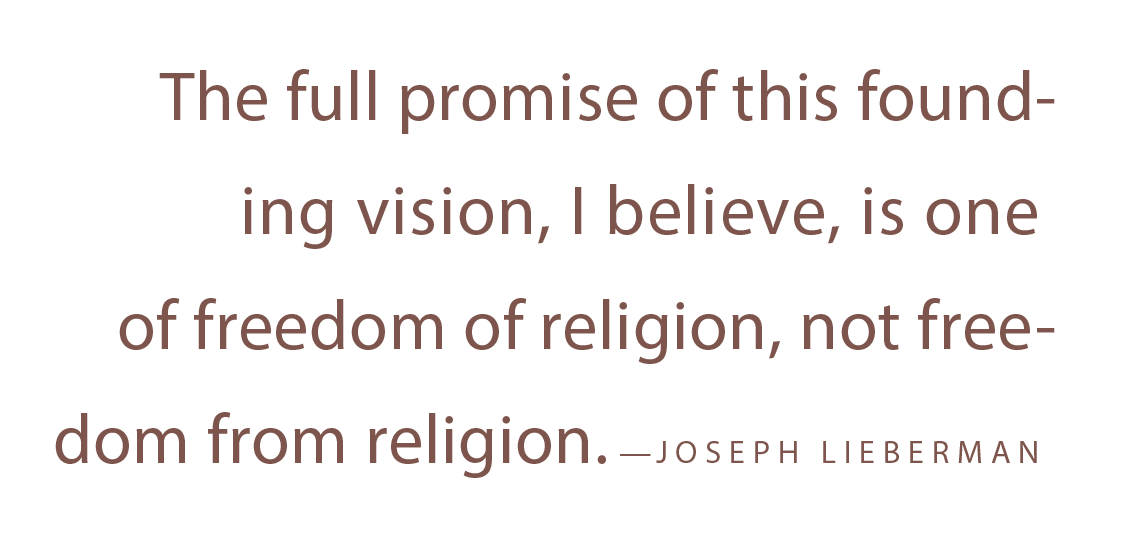
I was inspired to join the civil rights movement because of the values it represented, which were deeply rooted in my faith: the values of equality, inclusiveness, tolerance, and service to others. The purpose of the movement was best expressed by the words of the Reverend Dr. Martin Luther King Jr. in his soaring “I Have a Dream” speech. This call for freedom, for justice, and for a return to America’s founding values was the culmination of the historic March on Washington, a movement I took part in, in which thousands of us, of all religions, races, and nationalities, joined together peacefully and powerfully to petition our government to right the wrong of racial bigotry.
To me, the March on Washington was America at its best. It was America as my family and faith had encouraged me to believe it could be. During the early 1960s, I felt a boundless sense of hope and possibility about the future that lay ahead for our nation.
It was during this same time that another important barrier was broken. In the fall of my freshman year, a Roman Catholic—John F. Kennedy—was elected to the presidency for the first time in American history. At the time I sensed the possibility that, because of President Kennedy’s election, doors were opening for me too and for others who were part of minority faiths, races, and ethnicities.
In 2000 when Al Gore gave me the privilege of being the first Jewish American nominated for national office, I personally experienced the American people’s generosity of spirit, fairness, and acceptance of religious diversity. On the day I was nominated, an African American minister said to me, “In America, when a barrier is broken for one group, the doors of opportunity open wider for every American.”
I also felt free—indeed I was encouraged—to talk about my religion and the central role observance plays in my life. A veteran Secret Service agent who had worked several national campaigns told me he had never heard so many people say, “God bless you,” to a candidate. I believe these Americans were moved by the fundamental American principle of equal opportunity and respect for diversity of religious belief that has been at the heart of our American story from the beginning.
In the current presidential election cycle, faith and politics have once again become a source of some interest, controversy, and perhaps apprehension. My experience in 2000 gives me great confidence that the American people will again reject any sectarian religious tests for office and show their strong character, instinctive fairness, and steadfast belief in our Declaration of Independence and in our Constitution. That truly is the American way.
This article is adapted from a university forum address given by Joseph Lieberman, a U.S. senator from Connecticut, on Oct. 26, 2011.
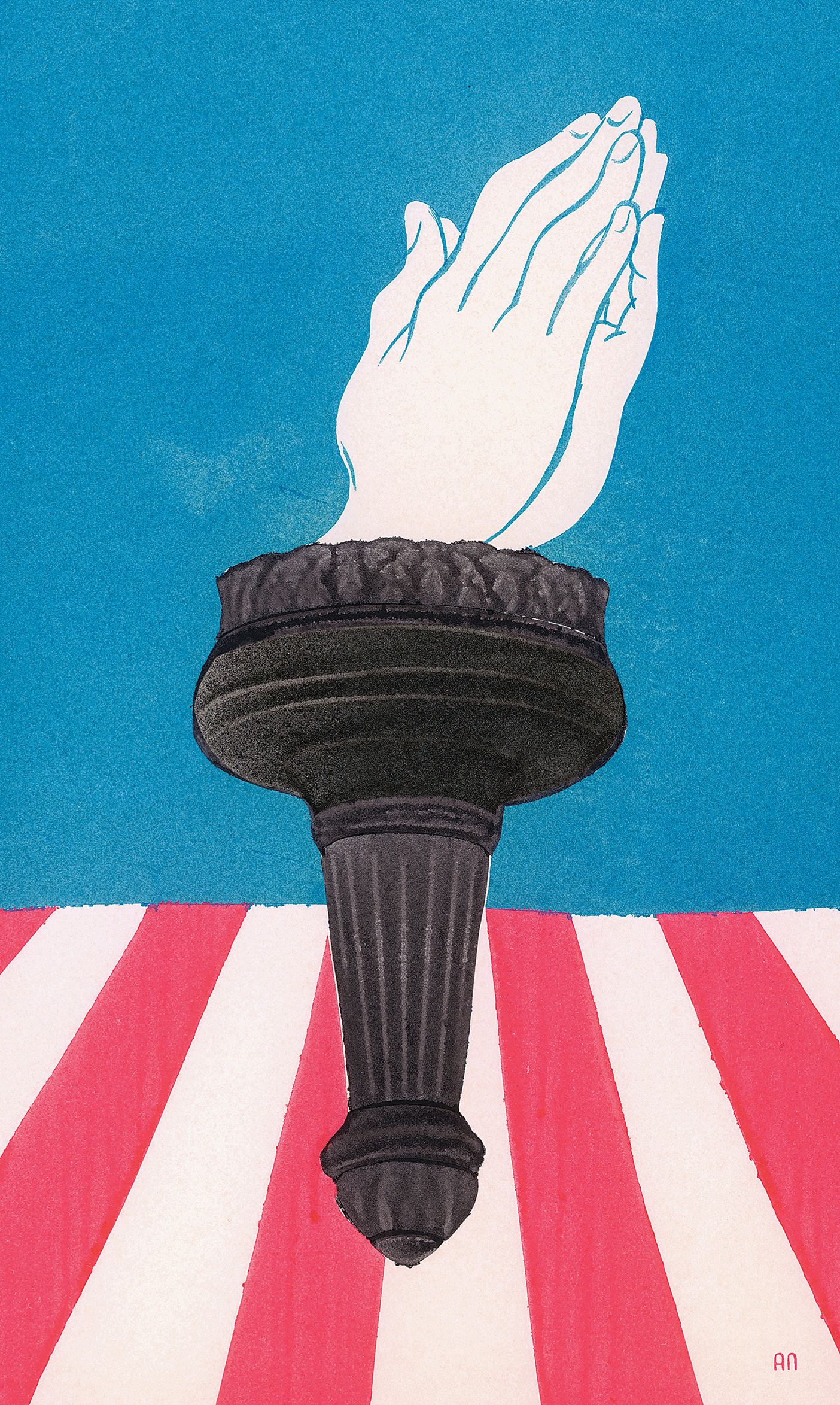
The Work of Civility
By Thomas B. Griffith (BA ’78)
I have applauded the increased use of the Constitution in our public discourse. But there can be a danger in invoking ultimate authority like the Constitution in support of an argument. If we are not careful, we may lose sight of one of the most important civic virtues: humility.
The incomparable Judge Learned Hand captured this sense of humility by quoting Puritan revolutionary Oliver Cromwell: “I beseech ye in the bowels of Christ, think ye may be mistaken.” Judge Hand added: “I should like to have that written over the portals of every church, every school, and every court house, and, may I say, of every legislative body in the United States.”1
Judge Hand also wisely noted, “The spirit of liberty is the spirit which is not too sure that it is right; the spirit of liberty is the spirit which seeks to understand the minds of other men and women.”2
I have noticed that some of the political debate in our community has lost sight of Judge Hand’s observation. I distance myself from the foolish nonsense that to be a Latter-day Saint in the United States today requires or even tends toward a particular partisan affiliation. Quoting his former professor, Harold Macmillan—prime minister of Great Britain and chancellor of Oxford University from 1960 to 1986—described the primary purpose of a university education to the graduating class at Oxford: “Nothing you learn here at Oxford will be of the slightest possible use to you later, save only this: that if you work hard and intelligently, you should be able to detect when a man is talking rot. And that is the main, if not the sole, purpose of education.”3 If your education at BYU hasn’t helped you see that such partisan talk is “rot,” then you have failed in your studies. And I’m not kidding.
Disagreement is critical to the well-being of our nation. But we must carry on our arguments with the realization that those with whom we disagree are not our enemies; rather, they are our colleagues in a great enterprise. When we respect each other enough to respond carefully to argument, we are filling roles necessary in a republic.
“Civility,” writes Peter Wehner, “has to do with . . . the respect we owe others as . . . fellow human beings. It is both an animating spirit and a mode of discourse. It establishes limits so we don’t treat opponents as enemies. And it helps inoculate us against one of the unrelenting temptations in politics (and in life more broadly), which is to demonize and dehumanize those who hold views different from our own. . . . Civility, properly understood, advances rigorous arguments for a simple reason: it forecloses ad hominem attacks, which is the refuge of sloppy, undisciplined minds.”4
As he frequently does, C. S. Lewis put it best and in language this audience will understand: “Next to the Blessed Sacrament itself, your neighbour is the holiest object presented to your senses.”5
And so, as we engage in the challenging and vexing work of citizenship, and especially as we debate fundamental principles of how best to carry out the unique calling that is America’s, keep in mind the counsel, nay the plea, of our greatest president, delivered at the most perilous time in our nation’s history:
We are not enemies, but friends. We must not be enemies. Though passion may have strained it must not break our bonds of affection. The mystic chords of memory, stretching from every battlefield and patriot grave to every living heart and hearthstone all over this broad land, will yet swell the chorus of the Union, when again touched, as surely they will be, by the better angels of our nature.6
Thank you very much. May God bless you. And may God bless the United States of America.
Thomas Griffith is a federal judge on the U.S. Court of Appeals for the D.C. Circuit. He gave the forum address from which this article is excerpted on Sept. 18, 2012.
NOTES
- Quoted in Fred R. Shapiro, ed., The Yale Book of Quotations (New Haven, Conn., Yale University Press, 2006), p. 336.
- Quoted in ibid.
- Quoted in Larry H. Peer, “Beethoven’s Kiss: On the Odd Reasons for Brigham Young’s Excellent University,” BYU devotional address (Dec 2, 2003), available
- Peter Wehner, “Civility as a Political Virtue,” Commentary, Dec. 1, 2010.
- C. S. Lewis, last paragraph of “The Weight of Glory,” in The Weight of Glory and Other Addresses (New York: Touchstone, 1996), p. 40.
- Abraham Lincoln, First Inaugural Address (4 March 1861), available here.
Feedback: Send comments on this article to magazine@byu.edu


